Nicola Griffith's Blog, page 90
June 7, 2014
In which I recommend The Blue Sword: YA for all of us
After I'd finished my interview on To the Best of Our Knowledge about Hild and had just pushed back my chair to go, the host Anne Strainchamps asked me if I'd like to recommend a book for a new feature they were doing. Sure, I said, and what followed was an utterly off-the-cuff three minutes conversation about Robin McKinley's The Blue Sword which is now live. [That's the streaming link. You can also download the file for your later listening pleasure.]
The Blue Sword was at the front of my mind when Anne asked me to recommend a book because I'd just started to read it aloud the night before and I'd been struck by its voice and rhythms and sure-footedness. In the on-air piece I talk about it being first person. It's not. It's in third although sometimes the narration slips into first without italics or quote marks. It can be mildly confusing, especially to read aloud cold, but after a couple of days I adapted and could give the non-dialogue narration the flavour of dialogue and reduce muddlement.
The Blue Sword might be one of McKinley's first novels but it shows all the trademarks of her later work: that absolute gift for making this imagined time and place feel as real as dirt, for showing people both ordinary and special, and for putting the reader right there in that particular time and place. I admit to flinching a little now at the implied class/caste issues, and the way McKinley doesn't quite escape the gender event horizon (though it's an admirable attempt), but for an early novel it's very fine. It's a serious story about finding one's place in the world and learning to belong, issues very much of interest to many of us, of any age.
Several people have asked me what I think of the recent kerfuffle about adults reading YA. I've talked about how I feel in general about YA before.
Meanwhile, The Blue Sword: Swords! Ponies! Magic! Go read it.
The Blue Sword was at the front of my mind when Anne asked me to recommend a book because I'd just started to read it aloud the night before and I'd been struck by its voice and rhythms and sure-footedness. In the on-air piece I talk about it being first person. It's not. It's in third although sometimes the narration slips into first without italics or quote marks. It can be mildly confusing, especially to read aloud cold, but after a couple of days I adapted and could give the non-dialogue narration the flavour of dialogue and reduce muddlement.
The Blue Sword might be one of McKinley's first novels but it shows all the trademarks of her later work: that absolute gift for making this imagined time and place feel as real as dirt, for showing people both ordinary and special, and for putting the reader right there in that particular time and place. I admit to flinching a little now at the implied class/caste issues, and the way McKinley doesn't quite escape the gender event horizon (though it's an admirable attempt), but for an early novel it's very fine. It's a serious story about finding one's place in the world and learning to belong, issues very much of interest to many of us, of any age.
Several people have asked me what I think of the recent kerfuffle about adults reading YA. I've talked about how I feel in general about YA before.
Meanwhile, The Blue Sword: Swords! Ponies! Magic! Go read it.
Published on June 07, 2014 09:58
June 6, 2014
Links to all Hild reviews, interviews, and essays
Now up, pages on:
most of the last six months' Hild reviewsHild interviewsHild miscellany (mostly essays I've written about Hild--the person, the book, the process--and odd or interesting features by others about same) fan art and cat picturesthe roundup of links roundups, so you can check for yourself what I might have missedThey are a bit messy, just first approximations right now, as much for my archives as anything. I'll tidy and organize them gradually. Meanwhile, feel free to fossick about. Enjoy.
most of the last six months' Hild reviewsHild interviewsHild miscellany (mostly essays I've written about Hild--the person, the book, the process--and odd or interesting features by others about same) fan art and cat picturesthe roundup of links roundups, so you can check for yourself what I might have missedThey are a bit messy, just first approximations right now, as much for my archives as anything. I'll tidy and organize them gradually. Meanwhile, feel free to fossick about. Enjoy.
Published on June 06, 2014 17:38
June 5, 2014
Coming soon...
Now that I've drawn a line under banging the Hild drum (at least until other publicity efforts gear up) I'm free to think about other things. I have glimmerings (not strong enough yet to label ideas) concerning blog posts on the following:
the power and authority of women—today and days pastchoices writers face when writing immersive fictionthoughts on the notion of branding for writersdog-whistle flap-copy3-part Women in the Arts: discriminations and triumphshow men can be allies for women in public situationsmaking character action dense and rich thoughts on how to approach diversity on conference/convention panelsIf you like the sound of any of those topics, let me know in a comment. If you loathe the idea of any one in particular, ditto.
ETA: Seriously, leave comments in the comments. If it's on Twitter or FB or personal email I can't keep track. Thanks.
the power and authority of women—today and days pastchoices writers face when writing immersive fictionthoughts on the notion of branding for writersdog-whistle flap-copy3-part Women in the Arts: discriminations and triumphshow men can be allies for women in public situationsmaking character action dense and rich thoughts on how to approach diversity on conference/convention panelsIf you like the sound of any of those topics, let me know in a comment. If you loathe the idea of any one in particular, ditto.
ETA: Seriously, leave comments in the comments. If it's on Twitter or FB or personal email I can't keep track. Thanks.
Published on June 05, 2014 09:16
June 4, 2014
Final Hild links roundup
For those who are counting, this is links roundup #20. I've put all twenty in one place. I'm also assembling humongous roundups of Hild reviews, interviews, essays and other miscellany. These may end up as one gigantic page or three smaller pages. Not sure yet. But I'll post links as and when they go up. There's a lot of stuff...
Which is why I'm stopping now. The book's been out nearly seven months, soon the publicity machine will start up again for the UK hardback release on July 24, followed by the US paperback on October 28, and Hild II isn't going to write itself. Also, frankly I'm itching to blog about something other than my own stuff.
So let's get to it.
NEWSStarting Friday, I answer your Hild questions at Goodreads' Ask the AuthorWinners were announced this weekend for the Bisexual Book Awards and the Lambda Literary Awards. Congratulations to all.REVIEWSBoston Bibliophile
"What I loved most about Hild is the relationships between the characters, particularly Hild and Cian's diverging friendship. I really felt her frustration and helplessness as they grew apart, as Cian's sexuality developed and lead him away from his childhood friend. But Hild also lives in a world of women..."
Spiral Galaxy Reads
"I felt that the portrayal of a time of great change and the people caught up in it rang completely true. I loved the character of Hild especially—it’s hard not to like someone that smart, especially when she’s believably flawed. "
Adventures in Reading
"Hild is a remarkable character, never anywhere close to perfect, but fully realized and growing all the while. But, it isn't just Hild that is a fleshed out character. From kings to warriors to peasants to slaves, Griffith presents each character as someone who might just have lived so many years ago, and with deft touches, those characters have their own lives that keep on going even when they are not on page."
Tinkerbird
"[Hild is] game of thrones meets katniss everdeen..."
Five Great Speculative Fiction Novels by Women
"This book is amazing on so many levels I’m going to apologize to author and reader in advance because I’m not going to be able to do it justice in the space I’ve allotted myself."
INTERVIEWSNone today, though there are three in the can (Locus, the SFWA website, and Smart Bitches, Trashy Books) and two queued up (Real Change and KSER).
MISCELLANEOUSQueering SFF Pride Month
"...when thinking about 'books that aren’t published as speculative but are queer and would totally appeal to an SFF audience,' I immediately landed on this one. / Probably because it’s also really, really good."
[Some interesting commentary here on sexuality in Hild--both in the body of the piece and the comments.]
Judging the Tiptree
"I'll bring up the question of Hild. We all thought it was brilliant, we all thought it explored gender in creative ways..."
Which is why I'm stopping now. The book's been out nearly seven months, soon the publicity machine will start up again for the UK hardback release on July 24, followed by the US paperback on October 28, and Hild II isn't going to write itself. Also, frankly I'm itching to blog about something other than my own stuff.
So let's get to it.
NEWSStarting Friday, I answer your Hild questions at Goodreads' Ask the AuthorWinners were announced this weekend for the Bisexual Book Awards and the Lambda Literary Awards. Congratulations to all.REVIEWSBoston Bibliophile
"What I loved most about Hild is the relationships between the characters, particularly Hild and Cian's diverging friendship. I really felt her frustration and helplessness as they grew apart, as Cian's sexuality developed and lead him away from his childhood friend. But Hild also lives in a world of women..."
Spiral Galaxy Reads
"I felt that the portrayal of a time of great change and the people caught up in it rang completely true. I loved the character of Hild especially—it’s hard not to like someone that smart, especially when she’s believably flawed. "
Adventures in Reading
"Hild is a remarkable character, never anywhere close to perfect, but fully realized and growing all the while. But, it isn't just Hild that is a fleshed out character. From kings to warriors to peasants to slaves, Griffith presents each character as someone who might just have lived so many years ago, and with deft touches, those characters have their own lives that keep on going even when they are not on page."
Tinkerbird
"[Hild is] game of thrones meets katniss everdeen..."
Five Great Speculative Fiction Novels by Women
"This book is amazing on so many levels I’m going to apologize to author and reader in advance because I’m not going to be able to do it justice in the space I’ve allotted myself."
INTERVIEWSNone today, though there are three in the can (Locus, the SFWA website, and Smart Bitches, Trashy Books) and two queued up (Real Change and KSER).
MISCELLANEOUSQueering SFF Pride Month
"...when thinking about 'books that aren’t published as speculative but are queer and would totally appeal to an SFF audience,' I immediately landed on this one. / Probably because it’s also really, really good."
[Some interesting commentary here on sexuality in Hild--both in the body of the piece and the comments.]
Judging the Tiptree
"I'll bring up the question of Hild. We all thought it was brilliant, we all thought it explored gender in creative ways..."
Published on June 04, 2014 07:29
May 29, 2014
Research for Hild?
In a way, I've been researching this book all my life. I grew up where Hild grew up, in Elmet which is now in West Yorkshire. So the physical details of Elmet and Deira, that is, the rest of Yorkshire—the change of the air as winters turns to spring, the sound of the trees at different times of year—are part of my understanding of the world. But I'd never been to Hadrian's Wall, or Bamburgh/Bebbanburg, or Yeavering; that's all research.From: Lauren
My friend Genevieve Williams (who is also a writer) saw you speak at SPL* and mentioned Hild, which I had heard about here and there, so I got it (on Kindle, sorry, I don't know if you get as much money from that) and I LOVE IT SO MUCH. I'm only halfway done, but I can't stop thinking about it and recommending it to people.
I feel like I need to take classes in Middle English (?) as well as Irish and Welsh and whatever else—a feeling I love! I'm a small farmer, too, and you totally nailed the seasonality, the dependency, the interconnectedness of the animals and their byproducts (the sacrifices, the wool, the fat) and the plants and their byproducts (the herbs, the flax) and the humans and the household. Hild after the battle at Lindsey is the perfect antidote to the dudely wars in Banks' books. Her conceptualization of politics as weaving makes me glad. I am basically just constantly rolling around with glee in the feminine, feminist worldview. Nobody's perfect, nobody's a stereotype, everyone is complex and good and bad and wonderful.
I know I'm not a reviewer, but here are my literary comparisons, which you can use in the tally or not: Marion Zimmer Bradley, Mists of Avalon—thematically, feministically (yes, that's a word now) GRRM of course, because he WISHES the first book of GoT was like this, but this is so much better Sena Jeter Naslund, Ahab's Wife—not thematically, but in terms of engrossingness (also a word), loveliness of language, and my evangelism about it to everyone Anyway I have no good conclusion because I just want to finish typing so I can go back to reading the book. Um, I'm supposed to ask a question! So ... how long did you research this book? Did you have to study other/old languages? Where did you do your research?
Thank you so much. I love the book a lot.
So much else is research, too. Some of this was systematic and conscious: I'm writing a novel about Hild, I will need to know X and Y and Z. Some of it haphazard and follow-my-nose-is: Oooh, so this is how they made a sword... Both sorts led me in interesting and unexpected directions: Huh, so what data do we have regarding physical remains of domestic animals? Or Which trees/birds/flowers/mammals were common and which rare in which parts of the country in, say, 620 CE?
For at least fifteen years I've been immersed in Britain of the first millennium. (I found so little available on the 7th C that I had to reach further back and then forward and try to fill in the gaps).
Then, too, scholarship is changing all the time. What was known to be known in 1970 is pretty different to what scholars believe to be true today. And, of course, these scholars tend to disagree.
Sometimes I got lost in minutiae. I'd read three different translations of the same poem and find the tone of each so shockingly at odds with the others that eventually I began to teach myself Old English so I could decide for myself. It didn't take me long to realise that this was an idiotic thing to do. To reach the level of expertise I was seeking might take twenty years. I'm a writer, not a Tolkien-level philologist!
It was around this point—2007 or so, I think—that I started pestering people who knew more than I ever would: experts in everything ranging from weaving to weather to warfare. Many, I found, kept blogs. (Some now hang out on Twitter though far fewer than is convenient for me, tuh.) I began reading their blogs. I began commenting on their blogs. It became apparent that I needed a blog of my own. Gemæcca, my research blog, was born. (And, oh, I wish I could go back and change that to Gemæcce! But by the time I saw my mistake, the URL was set. But on the blog I get to think aloud and take the temperature of those more expert than me; see for example this post on York in Hild's time for how this works.)
In my research I use everything: folk tale, music, personal experience, seriously abstruse papers, tattered old textbooks. I get information from friends and colleagues, Interlibrary Loan, books I put on gift wishlists, subscriptions to academic journals. (In my opinion academic publishing is a racket: $185 for a slim hardcover that probably only cost a dollar to produce and for which the author is barely compensated—yes, I've seen a couple of contracts; they are terrible. And just about all the extraneous work usually done by others in the trade press—for example, permissions, indexing, copyediting—is done by the authors and/or editors of the book. The graphic design is often execrable and production values shoddy. There are signs this is changing; as far as I'm concerned that changes can't happen fast enough.)
In terms of note-keeping, well, I'm sadly inefficient. Online tools such as Evernote and Scrivener are great—or would be if all the things I needed were digitised. But they're not. So I have notebooks, and digital files, and maps with pins, and giant charts, and folders of scribbles, and spreadsheets, and printouts, and bookmarks, and boxes of 3x5 cards, and just about everything you can think of. In other words, I'm hopelessly disorganised. But somehow it works. Swapping from one medium or form to another keeps me from settling on a path too soon. My research is like a life: absorbing, frustrating, thrilling, inefficient, varied.
The writing, too, is not straightforward. But I think I'll talk about that another time.
As for sales, I don't get as much money from a Kindle sales as the hardcover—but I get more from an ebook sale than I'll get from the paperback. And sales have gone better than I expected. Trust me, I am not complaining.
-----
* The Seattle Pubic Library, the Rem Koolhaas building downtown, where this photo was taken and this podcast taped
Published on May 29, 2014 06:04
May 26, 2014
Hild fan art and cat pictures...
You've seen all these before but hey it's a holiday and I'm taking the opportunity to stuff all the pix in one place. Enjoy.
These first two are pictures of Hild by Justine. In the first I imagine Hild's just figuring out this staff thing.
 And here she's a bit older, a bit more at home with it. But clearly unhappy about something. Maybe she's just seen what happened to the farming couple to whom she sent that family of bandits.
And here she's a bit older, a bit more at home with it. But clearly unhappy about something. Maybe she's just seen what happened to the farming couple to whom she sent that family of bandits.
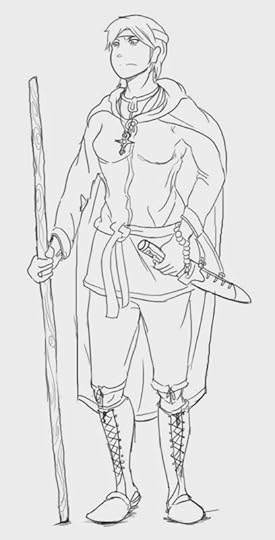 I suspect there'll be more and I can't wait to see where this goes.
I suspect there'll be more and I can't wait to see where this goes.
The second two are by Angelique, one drawn not long after a magnificent gift of wine while I was still writing the novel and neither of us knew where the story was heading or how much of Hild's life I would cover. But we did know we're both fans of Asterix the Gaul ...
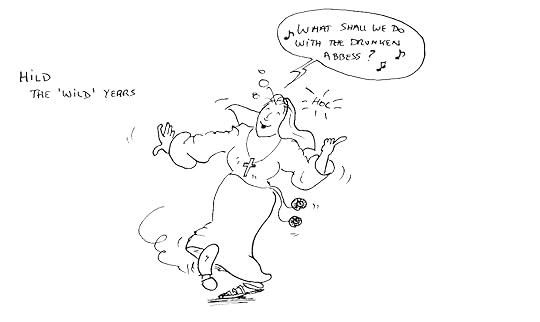 And the second came a little while later when I was working on both Hild and Angelique's amazing article in the Quarterly Review of Biology in which she explains her hypothesis that multiple sclerosis is not a disease of the immune system but a lipid metabolism disorder.
And the second came a little while later when I was working on both Hild and Angelique's amazing article in the Quarterly Review of Biology in which she explains her hypothesis that multiple sclerosis is not a disease of the immune system but a lipid metabolism disorder.
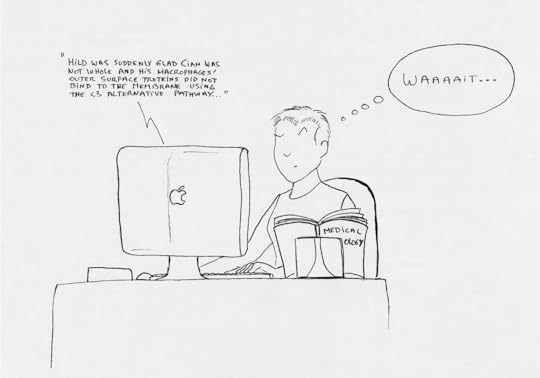 There's another but I still haven't sorted that out. Eh, I'll get to it one day.
There's another but I still haven't sorted that out. Eh, I'll get to it one day.
Meanwhile here are the cat pictures (and one dog):
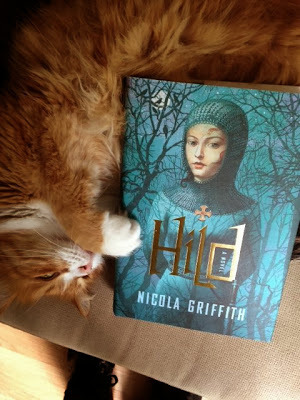 Ajax, who utterly dominates David J. Williams, can read upside down
Ajax, who utterly dominates David J. Williams, can read upside down
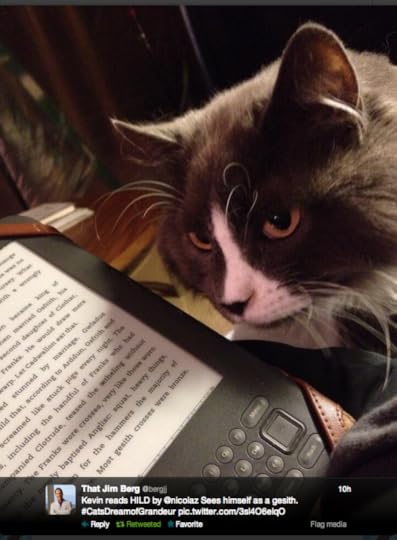 Kevin dreams of being a gesith
Kevin dreams of being a gesith
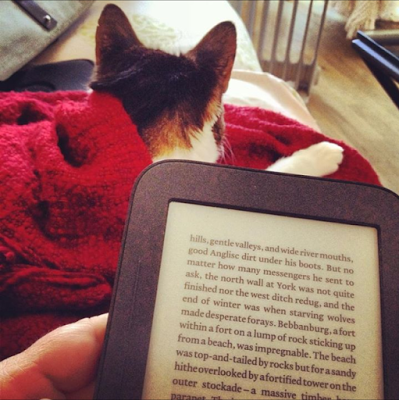 Stinkyboy guards Colleen
Stinkyboy guards Colleen
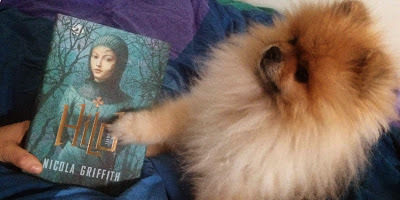 Petunia will fight you for a book
Petunia will fight you for a book
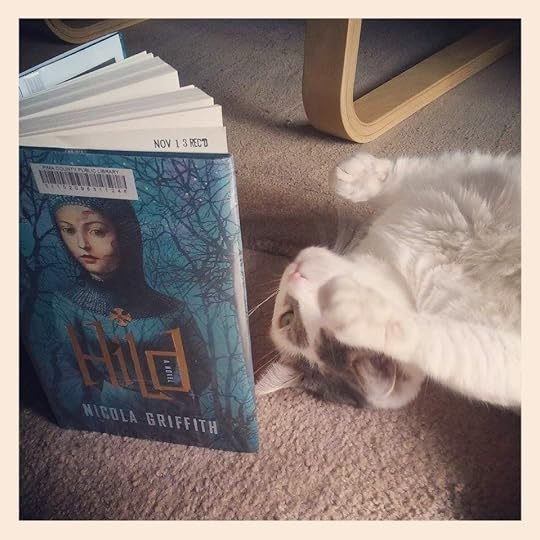 Fitz (who owns Traci Castleberry) also can read upside down--but prefers library books
Fitz (who owns Traci Castleberry) also can read upside down--but prefers library books
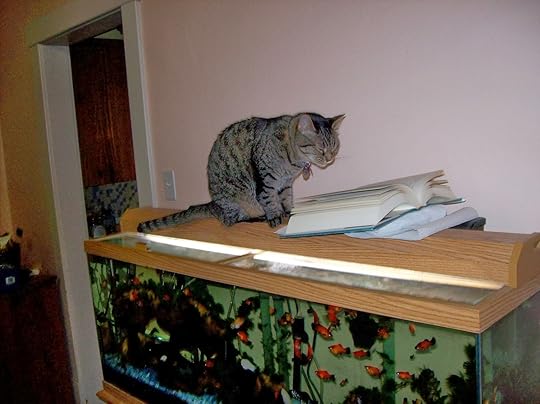 Bliss (who supervises Jo Booms) reads to the fish
Bliss (who supervises Jo Booms) reads to the fish
 Hilda (who advises Pastor Pilgrim) communes with an ARC
Hilda (who advises Pastor Pilgrim) communes with an ARC
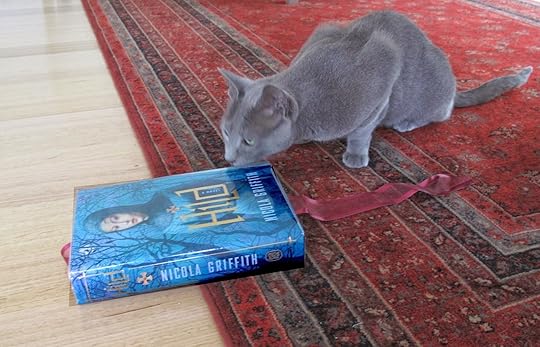 Talya the Russian Princess (who is served by Anne) has her way with Hild
Talya the Russian Princess (who is served by Anne) has her way with Hild
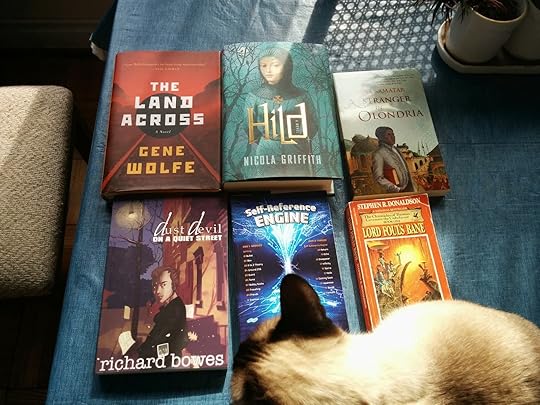 Cassie, who owns Brian Zottoli, ponders Hugo nominations
Cassie, who owns Brian Zottoli, ponders Hugo nominations
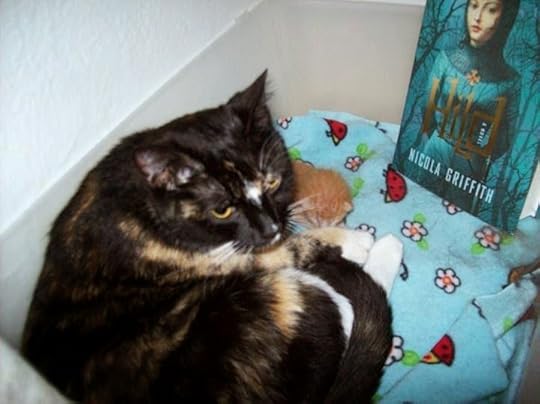 Joy, who owns Jo Booms (at least for now) reads her six-day old son, Wensleydale, to sleep...
Joy, who owns Jo Booms (at least for now) reads her six-day old son, Wensleydale, to sleep...
I've probably missed a few. Feel free to resend/remind. I'll post updates on the page version of this post.
These first two are pictures of Hild by Justine. In the first I imagine Hild's just figuring out this staff thing.
 And here she's a bit older, a bit more at home with it. But clearly unhappy about something. Maybe she's just seen what happened to the farming couple to whom she sent that family of bandits.
And here she's a bit older, a bit more at home with it. But clearly unhappy about something. Maybe she's just seen what happened to the farming couple to whom she sent that family of bandits. I suspect there'll be more and I can't wait to see where this goes.
I suspect there'll be more and I can't wait to see where this goes.The second two are by Angelique, one drawn not long after a magnificent gift of wine while I was still writing the novel and neither of us knew where the story was heading or how much of Hild's life I would cover. But we did know we're both fans of Asterix the Gaul ...
 And the second came a little while later when I was working on both Hild and Angelique's amazing article in the Quarterly Review of Biology in which she explains her hypothesis that multiple sclerosis is not a disease of the immune system but a lipid metabolism disorder.
And the second came a little while later when I was working on both Hild and Angelique's amazing article in the Quarterly Review of Biology in which she explains her hypothesis that multiple sclerosis is not a disease of the immune system but a lipid metabolism disorder. There's another but I still haven't sorted that out. Eh, I'll get to it one day.
There's another but I still haven't sorted that out. Eh, I'll get to it one day.Meanwhile here are the cat pictures (and one dog):
 Ajax, who utterly dominates David J. Williams, can read upside down
Ajax, who utterly dominates David J. Williams, can read upside down Kevin dreams of being a gesith
Kevin dreams of being a gesith
 Stinkyboy guards Colleen
Stinkyboy guards Colleen
 Petunia will fight you for a book
Petunia will fight you for a book Fitz (who owns Traci Castleberry) also can read upside down--but prefers library books
Fitz (who owns Traci Castleberry) also can read upside down--but prefers library books
 Bliss (who supervises Jo Booms) reads to the fish
Bliss (who supervises Jo Booms) reads to the fish
 Hilda (who advises Pastor Pilgrim) communes with an ARC
Hilda (who advises Pastor Pilgrim) communes with an ARC Talya the Russian Princess (who is served by Anne) has her way with Hild
Talya the Russian Princess (who is served by Anne) has her way with Hild  Cassie, who owns Brian Zottoli, ponders Hugo nominations
Cassie, who owns Brian Zottoli, ponders Hugo nominations Joy, who owns Jo Booms (at least for now) reads her six-day old son, Wensleydale, to sleep...
Joy, who owns Jo Booms (at least for now) reads her six-day old son, Wensleydale, to sleep...I've probably missed a few. Feel free to resend/remind. I'll post updates on the page version of this post.
Published on May 26, 2014 06:18
May 21, 2014
Hild roundup #19
Hild has now been out more than six months. Unless something extraordinary happens, I'll call it a day with the next roundup. I'm massively proud of the novel but 20 posts about its reception is enough, even for me. In fact, I've just listed the latest reviews instead of excerpting them. The first couple are interesting.
All previous roundups are here.
NEWSThe Nebula Awards Weekend was wonderful. List of winners--congrats to all--here. During the weekend I did three different interviews. I'll post links as and when they go live.Hild is a finalist for the John W. Campbell Memorial Award.The Lambda Literary Awards are in just over a week. Unfortunately I won't be able to attend as I'm teaching here in Seattle. But good luck to all; I wish I could be there.REVIEWSThe Cannonball ReadSkygiantsBefore It's NewsWhen We All Lived in the Forest...AudibleMISCELLANEOUS
Some Hild fan art for you, from Justine, who also wrote a review: And one from Angelique, who drew this a couple of years ago when Hild was still in the rewrite stage. (Yep, we both love Asterix books. There's another in similar style but it doesn't belong to me so might take some time to post.) I love them both; they make me grin really hard. Enjoy.
And one from Angelique, who drew this a couple of years ago when Hild was still in the rewrite stage. (Yep, we both love Asterix books. There's another in similar style but it doesn't belong to me so might take some time to post.) I love them both; they make me grin really hard. Enjoy.
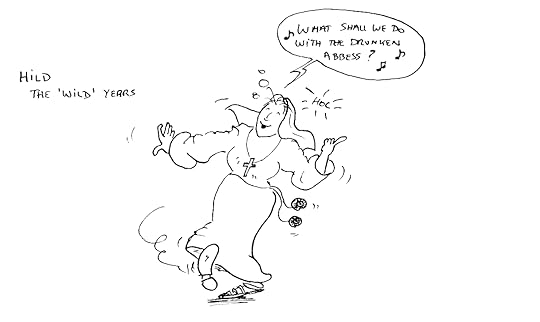
All previous roundups are here.
NEWSThe Nebula Awards Weekend was wonderful. List of winners--congrats to all--here. During the weekend I did three different interviews. I'll post links as and when they go live.Hild is a finalist for the John W. Campbell Memorial Award.The Lambda Literary Awards are in just over a week. Unfortunately I won't be able to attend as I'm teaching here in Seattle. But good luck to all; I wish I could be there.REVIEWSThe Cannonball ReadSkygiantsBefore It's NewsWhen We All Lived in the Forest...AudibleMISCELLANEOUS
Some Hild fan art for you, from Justine, who also wrote a review:
 And one from Angelique, who drew this a couple of years ago when Hild was still in the rewrite stage. (Yep, we both love Asterix books. There's another in similar style but it doesn't belong to me so might take some time to post.) I love them both; they make me grin really hard. Enjoy.
And one from Angelique, who drew this a couple of years ago when Hild was still in the rewrite stage. (Yep, we both love Asterix books. There's another in similar style but it doesn't belong to me so might take some time to post.) I love them both; they make me grin really hard. Enjoy.
Published on May 21, 2014 05:57
May 13, 2014
About the real Hild
In case you missed it, in the back of Hild I wrote a biographical note. It reads, essentially:
Hild was real. She was born fourteen hundred years ago in Anglo-Saxon England. Everything we know about her comes from the Venerable Bede's Ecclesiastical History of the English Nation, the foundational text of English history. Of that work, a scant five pages refer to Hild. You can read those, translated by Professor Roy M. Liuzza here (Broadview Anthology of British Literature, Vol. 1, Peterborough, ON: Broadview Press, 2006; hosted with permission of the translator).
The first half of her life can be summed up in one short paragraph. She is born circa 614 CE, after her mother, Breguswith, has a dream about her unborn child being a jewel that brings light to the land. Hild's father, Hereric, of the royal house of Deira, was poisoned while in exile at the court of Ceredig, king of Elmet. Her older sister, Hereswith, marries a nephew of Rædwald, king of East Anglia. Hild, along with many of Edwin's household, is baptised by Paulinus c. 627 in York. She then disappears from the record until 647 when she reappears in East Anglia about to take ship for Gaul to join her sister—at which point she is recruited to the church by bishop Aidan.
We don't know where Hild was born exactly and when her father died—or her mother. We have no idea what she looked like, what she was good at, whether she married or had children. But clearly she was extraordinary. In a time of warlords and kings, when might was right, she begins as the second daughter of a homeless widow, probably without much in the way of material resources and certainly in an illiterate culture, and ends a powerful advisor to statesmen-kings and teacher of five bishops. Today she is revered as St Hilda.
So how did Hild ride this cultural transformation of petty kingdoms into sophisticated and literate proto-states? We don't know. I wrote this book to find out. I learnt what I could of the late sixth and early seventh century: ethnography, archaeology, poetry, numismatics, jewellery, textiles, languages, food production, weapons, and more. And then I recreated that world and its known historical incidents, put Hild inside, and watched, fascinated, as she grew up, influenced and influencing...
The first novel ends at the end of 631 CE (or 632 if you follow Bede, or possibly even 634 according to some annals; I explain the dates here--just go with it), a little beyond the beginning of that Bede-ish caesura. Book II takes place almost wholly within it. Some of the exterior referents of her history are known—which king acceded and/or got his head hacked off when; who was bishop where; the name and fate of at least one her sister's children (and countless other relatives)—but the story of Hild herself? I'm absolutely, completely making it up.
However, nothing in any of the books I plan to write about Hild contravenes what I know to be known. It could have happened this way.
That's all.
Hild was real. She was born fourteen hundred years ago in Anglo-Saxon England. Everything we know about her comes from the Venerable Bede's Ecclesiastical History of the English Nation, the foundational text of English history. Of that work, a scant five pages refer to Hild. You can read those, translated by Professor Roy M. Liuzza here (Broadview Anthology of British Literature, Vol. 1, Peterborough, ON: Broadview Press, 2006; hosted with permission of the translator).
The first half of her life can be summed up in one short paragraph. She is born circa 614 CE, after her mother, Breguswith, has a dream about her unborn child being a jewel that brings light to the land. Hild's father, Hereric, of the royal house of Deira, was poisoned while in exile at the court of Ceredig, king of Elmet. Her older sister, Hereswith, marries a nephew of Rædwald, king of East Anglia. Hild, along with many of Edwin's household, is baptised by Paulinus c. 627 in York. She then disappears from the record until 647 when she reappears in East Anglia about to take ship for Gaul to join her sister—at which point she is recruited to the church by bishop Aidan.
We don't know where Hild was born exactly and when her father died—or her mother. We have no idea what she looked like, what she was good at, whether she married or had children. But clearly she was extraordinary. In a time of warlords and kings, when might was right, she begins as the second daughter of a homeless widow, probably without much in the way of material resources and certainly in an illiterate culture, and ends a powerful advisor to statesmen-kings and teacher of five bishops. Today she is revered as St Hilda.
So how did Hild ride this cultural transformation of petty kingdoms into sophisticated and literate proto-states? We don't know. I wrote this book to find out. I learnt what I could of the late sixth and early seventh century: ethnography, archaeology, poetry, numismatics, jewellery, textiles, languages, food production, weapons, and more. And then I recreated that world and its known historical incidents, put Hild inside, and watched, fascinated, as she grew up, influenced and influencing...
The first novel ends at the end of 631 CE (or 632 if you follow Bede, or possibly even 634 according to some annals; I explain the dates here--just go with it), a little beyond the beginning of that Bede-ish caesura. Book II takes place almost wholly within it. Some of the exterior referents of her history are known—which king acceded and/or got his head hacked off when; who was bishop where; the name and fate of at least one her sister's children (and countless other relatives)—but the story of Hild herself? I'm absolutely, completely making it up.
However, nothing in any of the books I plan to write about Hild contravenes what I know to be known. It could have happened this way.
That's all.
Published on May 13, 2014 04:32
May 6, 2014
Hild's first religious foundation
For those who like that sort of thing, there's a long post up on my research blog about my thoughts on the site of Hild's first religious foundation.
It's chewy, with Latin and maps.
Enjoy!
It's chewy, with Latin and maps.
Enjoy!
Published on May 06, 2014 05:03
May 3, 2014
Friday, 9th May at 7 pm: reading at Elliott Bay Book Company
Join me and a bunch of other Lambda Literary Award finalists at the Elliott Bay Book Company for a reading and celebration on Friday night at 7 pm.
The evening, MC'd by Matthilda Sycamore, will feature ten writers from eight books contending for the prizes (one is an anthology, so the editor and two contributors will be attending):
Mattilda B. SycamoreNicola GriffithChavisa WoodsEvan PetersonRoma RayeAmber DawnJason FriedmanL.C. ChaseAmy ShepherdRyan CrawfordI will, of course, be reading from Hild .
My hope is that we start on time, move fast (they will be short readings, less than five minutes each), and let the nice bookstore employees have the room in an expeditious manner so they can get home. But I just want to point out that Elliott Bay has a café that sells beer. And if I remember correctly that's open til 10 pm. Could be fun. Just saying.
The evening, MC'd by Matthilda Sycamore, will feature ten writers from eight books contending for the prizes (one is an anthology, so the editor and two contributors will be attending):
Mattilda B. SycamoreNicola GriffithChavisa WoodsEvan PetersonRoma RayeAmber DawnJason FriedmanL.C. ChaseAmy ShepherdRyan CrawfordI will, of course, be reading from Hild .
My hope is that we start on time, move fast (they will be short readings, less than five minutes each), and let the nice bookstore employees have the room in an expeditious manner so they can get home. But I just want to point out that Elliott Bay has a café that sells beer. And if I remember correctly that's open til 10 pm. Could be fun. Just saying.
Published on May 03, 2014 17:58



